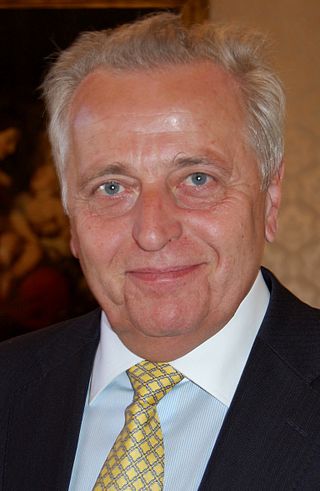
Wolfgang Schüssel is an Austrian politician. He was Chancellor of Austria for two consecutive terms from February 2000 to January 2007. While being recognised as a rare example of an active reformer in contemporary Austrian politics, his governments were also highly controversial from the beginning, starting with the fact that he formed a coalition government with Jörg Haider's Freedom Party of Austria (FPÖ) on both occasions. In 2011, he retired from being an active member of parliament due to a multitude of charges of corruption against members of his governments.

Alfred Gusenbauer is an Austrian politician who until 2008 spent his entire professional life as an employee of the Social Democratic Party of Austria (SPÖ) or as a parliamentary representative. He headed the SPÖ from 2000 to 2008, and served as Chancellor of Austria from January 2007 to December 2008. Since then, he has pursued a career as a consultant and lecturer, and as a member of supervisory boards of Austrian companies.
Same-sex marriage has been legal in Austria since 1 January 2019. On 4 December 2017, the Constitutional Court ruled that the non-discrimination and equality provisions of the Constitution of Austria guarantee same-sex couples the right to marry. The decision took effect on 1 January 2019, making Austria the 24th country in the world and the fifteenth in Europe to allow same-sex couples to marry nationwide. Polling indicates that a majority of Austrians support the legal recognition of same-sex marriage.

Legislative elections were held in Austria on 28 September 2008 to elect the 24th National Council, the lower house of Austria's bicameral parliament. The snap election was called after Austrian People's Party (ÖVP) withdrew from the ruling grand coalition with the Social Democratic Party of Austria (SPÖ) in July. Due to dissatisfaction with the governing parties, the opposition and minor parties were expected to make significant gains. Opinion polling indicated that up to seven parties could potentially win seats.

Johannes Hahn is an Austrian politician who has served as European Commissioner for Budget and Administration under Ursula von der Leyen since 1 December 2019.

Johannes "Hannes" Androsch is an Austrian entrepreneur and consultant; a former Social Democrat top politician who served as an Austrian Finance Minister from 1970 to 1981 and additionally as vice chancellor from 1976 to 1981; and a former banker who from 1981 to 1988 was the general director of the Creditanstalt-Bankverein and subsequently an advisor to the World Bank. From 1989 onward he built an industrial investment group, Androsch International Consulting (AIC), which is a major factor in Austria's internationally active corporate landscape. In addition, Androsch's foundation is an important sponsor of research and development activities in Austria, where he is regularly consulted on matters of political, economic and financial importance.

Barbara Prammer was an Austrian politician and member of the Social Democratic Party of Austria (SPÖ). In 2006 she was the first woman to become President of the National Council of Austria, an office she held until her death.
This article covers the formation of the Faymann cabinet following the 2008 parliamentary election in Austria.

Gabriele Heinisch-Hosek is an Austrian politician. She served as minister without portfolio between 2 December 2008 and 16 December 2013. In addition, she was the federal minister for women and civil service within the Federal Chancellery between 18 December 2008 and 18 May 2016.

NEOS – The New Austria and Liberal Forum is a liberal political party in Austria. It was founded as NEOS – The New Austria in 2012. In 2014, NEOS merged with Liberal Forum and adopted its current name.

Evelyn Regner is an Austrian lawyer and politician who has been serving as a Member of the European Parliament from Austria since 2009. She is a member of the Social Democratic Party of Austria, part of the Progressive Alliance of Socialists and Democrats and elected vice-president of the European Parliament.

Rudolf Hundstorfer was an Austrian social democratic politician who served as president of the Austrian Trade Union Federation (ÖGB). Hundstorfer was from December 2008 to January 2016 the Federal Minister for Labour, Social Affairs and Consumer Protection.

Christian Kern is an Austrian businessman and former politician who served as Chancellor of Austria from 17 May 2016 to 18 December 2017 and chairman of the Social Democratic Party from 25 June 2016 to 25 September 2018.

Legislative elections were held in Austria on 29 September 2019 to elect the 27th National Council, the lower house of Austria's bicameral parliament. The snap election was called in the wake of the Ibiza affair in May, which caused the resignation of Vice Chancellor Heinz-Christian Strache and the collapse of the governing coalition of the Austrian People's Party (ÖVP) and Freedom Party of Austria (FPÖ). The government subsequently lost a motion of no confidence in parliament, before ÖVP Chancellor Sebastian Kurz was replaced by non-partisan Brigitte Bierlein on an interim basis.

Andreas Schieder is an Austrian politician who has been a Member of the European Parliament since 2019.

Pamela Rendi-Wagner is an Austrian physician and politician who is the current director of the European Centre for Disease Prevention and Control and who previously served as chairwoman of the Social Democratic Party (SPÖ) from 2018 to 2023. She was the first woman to lead the SPÖ.

Hilde Hawlicek is an Austrian retired politician and former Minister for Education, Arts and Sport.

Eleonora "Lore" Hostasch is an Austrian politician and trade union leader.

Helga Konrad is an Austrian politician.

Wilhelmine Moik was an Austrian politician and trade unionist.



















